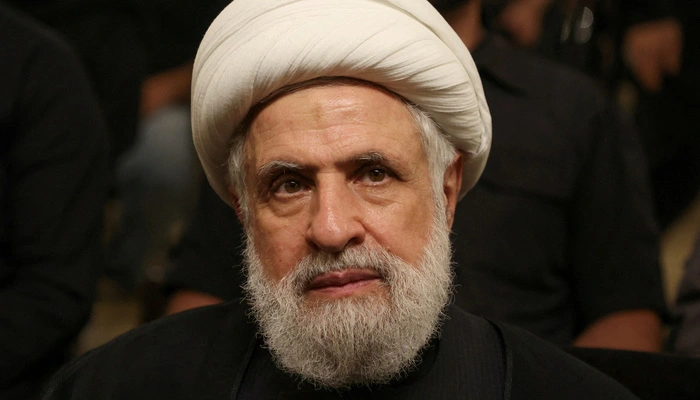Political Moves Won’t End Hezbollah-Israel War: Naim Qassem

Hezbollah’s deputy leader, Naim Qassem, stated that only military developments on the battlefield could bring an end to the ongoing conflict with Israel. In a clear message, Qassem emphasized that political moves would not stop the war, now over a year old. He asserted that the only way to halt the hostilities was through continued fighting, not negotiations.
“Our conviction is that only one thing can stop this war of aggression, and that is the battlefield,” Qassem said, reinforcing his belief that political action would not resolve the issue.
No Political Action Will End the Conflict
The conflict, which began over a year ago, is ongoing in parallel with Israel’s military offensive in Gaza. Qassem, who assumed leadership of Hezbollah after the killing of his predecessor, Sayyed Hassan Nasrallah, in Israeli airstrikes in September, dismissed the idea that political solutions could bring peace.
In a pre-recorded televised address, Qassem made it clear that only when Israel ceases its attacks on Lebanon could indirect negotiations begin through the Lebanese government. He stressed that these talks would require full protection of Lebanese sovereignty, though he did not elaborate on the specifics.
Conditions for Peace Talks
Qassem outlined a path for future talks, but only under specific conditions. He stated that indirect negotiations would be possible through Lebanon’s parliament and its Speaker, Nabih Berri, but only if Israel stopped its aggression. However, he made it clear that these negotiations must ensure Lebanon’s sovereignty is fully protected.
NEPRA Cuts Fuel Charges to Ease Electricity Costs for September
“At that moment, there is a path for negotiations that we have clearly defined,” Qassem added, but warned that any discussions would be contingent on Israel’s actions to halt its attacks.
Ongoing Israeli Attacks on Lebanon
Israeli airstrikes across Lebanon have led to a growing number of casualties. Recent reports indicate that at least 37 people were killed and 105 injured in the latest attacks. According to Lebanon’s Health Ministry, over 3,000 people have died since Israel began its offensive against Lebanon last October. The majority of those killed in the attacks were civilians.
Hezbollah’s leader emphasized that these continued Israeli strikes, which have severely impacted Lebanon’s civilian population, underscore the urgency of a resolution.
Iraq Rejects Use of Territory for Attacks
Iraq has firmly rejected the idea of allowing its territory to be used for launching attacks in the ongoing Middle East conflict. After reports suggested that Iran might retaliate against Israeli missile strikes, Iraq’s National Security Council issued a statement denying these claims. The statement described the reports as “pretexts” aimed at justifying attacks on Iraq’s sovereignty.
Israeli and US Leaders Discuss Security
In another development, Israeli Prime Minister Benjamin Netanyahu spoke with U.S. President-elect Donald Trump after Trump’s victory in the recent presidential election. According to Netanyahu’s office, the conversation was “warm and cordial” and focused on mutual concerns over the Iranian threat. The two leaders discussed strategies to enhance Israel’s security and cooperate on regional stability.
Despite the ongoing conflict, both Netanyahu and Trump reaffirmed their commitment to addressing shared security challenges, particularly regarding Iran.
Follow Day News on Google News, Instagram, YouTube, Facebook, Whats App, and TikTok for latest updates




